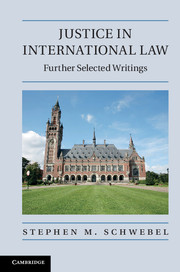Book contents
- Frontmatter
- Contents
- PART I International Court of Justice
- 1 Reflections on international adjudication
- 2 The impact of the International Court of Justice
- 3 The politics of adjudication
- 4 National judges and judges ad hoc of the International Court of Justice
- 5 The roles of the Security Council and the International Court of Justice in the application of international humanitarian law
- 6 The inter-active influence of the International Court of Justice and the International Law Commission
- 7 A site visit of the World Court
- 8 The proliferation of international tribunals: threat or promise?
- 9 The Gulf of Maine maritime boundary delimitation: the constitution of the chamber
- 10 The judgment of the International Court of Justice in the case concerning the Gabčíkovo-Nagymaros Project (Hungary/Slovakia)
- 11 Gorbachev embraces compulsory jurisdiction
- PART II International arbitration
- PART III Miscellaneous
- Collected publications, judicial opinions and book reviews
- Index
- References
4 - National judges and judges ad hoc of the International Court of Justice
from PART I - International Court of Justice
Published online by Cambridge University Press: 07 September 2011
- Frontmatter
- Contents
- PART I International Court of Justice
- 1 Reflections on international adjudication
- 2 The impact of the International Court of Justice
- 3 The politics of adjudication
- 4 National judges and judges ad hoc of the International Court of Justice
- 5 The roles of the Security Council and the International Court of Justice in the application of international humanitarian law
- 6 The inter-active influence of the International Court of Justice and the International Law Commission
- 7 A site visit of the World Court
- 8 The proliferation of international tribunals: threat or promise?
- 9 The Gulf of Maine maritime boundary delimitation: the constitution of the chamber
- 10 The judgment of the International Court of Justice in the case concerning the Gabčíkovo-Nagymaros Project (Hungary/Slovakia)
- 11 Gorbachev embraces compulsory jurisdiction
- PART II International arbitration
- PART III Miscellaneous
- Collected publications, judicial opinions and book reviews
- Index
- References
Summary
When the Statute of the Permanent Court of International Justice was drafted by an Advisory Committee of Jurists in 1920, a paramount question was, should a judge of the nationality of a State party to the case sit?
The sensitivity of the issue was encapsulated by a report of a committee of the Court in 1927 on the occasion of a revision of the Rules of Court. It observed that:
In the attempt to establish international courts of justice, the fundamental problem always has been, and probably always will be, that of the representation of the litigants in the constitution of the tribunal. Of all influences to which men are subject, none is more powerful, more pervasive, or more subtle, than the tie of allegiance that binds them to the land of their homes and kindred and to the great sources of the honours and preferments for which they are so ready to spend their fortunes and to risk their lives. This fact, known to all the world, the [Court's] Statute frankly recognises and deals with.
But how to recognize and deal with ties of allegiance was controversial. The authors of the Root-Phillimore plan, which so profoundly influenced the drafting of the Statute in 1920, maintained that judges of the nationality of a party to the case should sit.
- Type
- Chapter
- Information
- Justice in International LawFurther Selected Writings, pp. 25 - 40Publisher: Cambridge University PressPrint publication year: 2011

